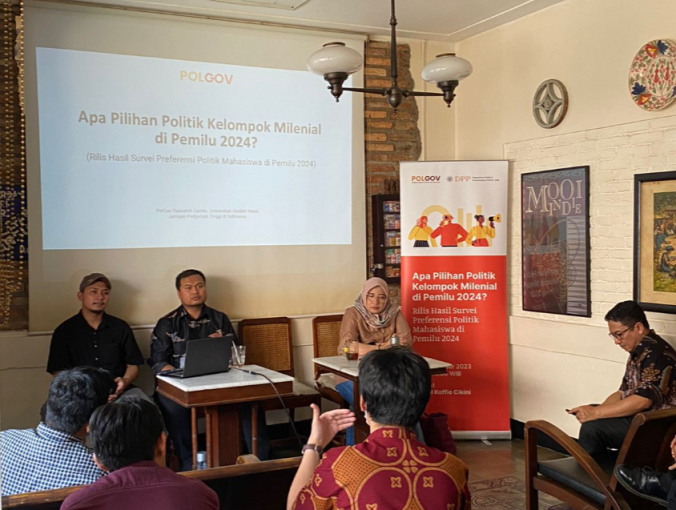
Jakarta, September 26th 2023─The electoral year is fast approaching. The youth group (millennials) is a strategic target seeing its enormous potential to reach 56.45% or around 113 million voters. One of the young voter groups is university students. Students’ opinions and preferences are central because their level of literacy and attention to public issues and political dynamics can have implications for the political attitudes of other voter groups. On this basis, the “PolGov” Research Center, Department of Politics and Government, FISIPOL UGM conducted a survey as an effort to map these political opinions and preferences. The release of the Survey Results of Political Opinions and Preferences of Indonesian Students in the 2024 Election entitled “What are the Political Choices of the Millennial Group in the 2024 Election?” was delivered on Tuesday (26/9) at Bakoel Koffie Cikini, Jakarta. Attended by three speakers, namely Arya Budi (Lecturer at the Department of Politics and Government), Faiz Kasyfilham (POLGOV UGM Researcher), and Dr. Nihayatul Wafiroh (Member of the House of Representatives).
The survey was conducted over two weeks, from July 24, 2023 to August 7, 2023 among 719 students spread across more than 30 universities from various provinces in Indonesia. Efforts to reach students involved lecturers and researchers who teach at the university, which is also a network of academics and researchers of the “PolGov” Research Center. Sampling (respondents) in this survey uses a chain-referral sampling method or also commonly known as snowball sampling by recruiting other students as survey respondents. The data collection mode is self-enumeration or often also called self-administered survey where students fill out surveys on the Qualtrics platform independently through their respective devices.
In short, the sampling method in this survey is non-probabilistic so that the respondents in this survey do not represent the student population in Indonesia, which is a limitation in this survey. The number of respondents and their distribution from various regions is intended to illustrate the opinions and preferences of students in various universities and diverse backgrounds.
An outline of the findings of this survey is as follows:
First, almost half of the student respondents in this survey stated that job availability (47.30%) is the issue that is considered most urgent to be addressed by future presidential candidates, although law enforcement (20.66%) and education costs (13.71%) are also issues that are considered urgent to be addressed.
Second, with regard to the evaluation of institutions with an assessment score of 0-100, among judicial institutions independent of the executive branch of power, the Supreme Court received the highest level of trust (60.34) while the KPK (52.72) received the lowest score. Meanwhile, among executive branch institutions, the TNI received the highest level of trust while POLRI (44.18) received the lowest. Among the intermediary institutions, the election organizing branch which includes the KPU, BAWASLU, and DKPP get almost the same level of trust at around 56, while the DPR (40.61) is the lowest. Third, with regard to party political choice, more than half of the student respondents (56.85%) are still undecided or undisclosed about their party choice, although Gerindra (11.07%), PDIP (8.63%), Golkar (4.69%), and Nasdem (4.32%) are the parties with the most votes above 4%.
Fourth, in relation to the political choice of the vice presidential candidate, the highest number of identified voters expressed their preference for Prabowo Subianto (17.92%), then Ganjar Pranowo (13.96%), and finally Anies Baswedan (10.38%), while 53% of student respondents did not identify their political choice. Further analysis based on the measurement of the closeness of the presidential candidates, the level of electability of Prabowo (30.19%) and Ganjar (30.00%) is very competitive, while Anies (18.30%) is quite behind.
Finally, the release of the survey results is expected to encourage presidential candidates and party elites to consider students’ preferences and issues of concern in their political platforms and agendas. political agenda.
